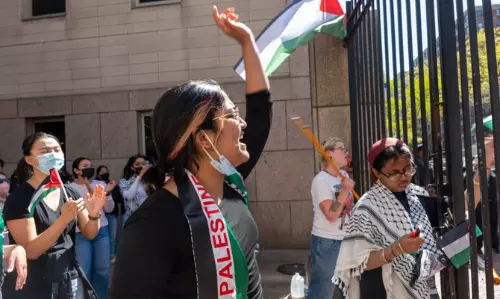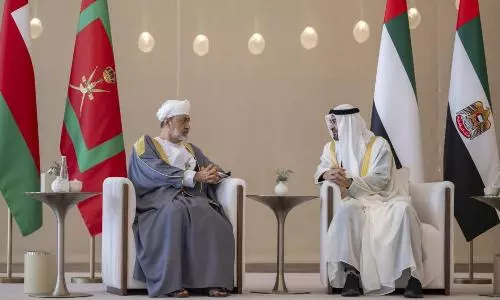
Haj sans Mehram: Concession thanks to Saudi, not Modi
text_fieldsWill a 25-year old woman be able to travel alone without a male escort ('mehram')and perform haj, based on prime minister Narendra Modi's declaration that such a mehram is no more required for permission to travel on pilgrimage? The probable answer is 'No'.
It is much more than Modi matter, because what matters more is whether Saudi decision allows a woman without her close male relative (fulfilling certain conditions of age and relations) followed for decades now. The Indian haj authorities have been following those guidelines and thus not allowing female pilgrims without mehram.
But... there came new if and but more recently. In 2012, about a thousand Nigerian women who arrived for haj without mehram were sent back for that reason. This raised some debate and clamour for a change in policy. Following this, the Saudi authorities allowed a concession for women aged 45 and above, and travelling in groups to perform haj without male attendant, but on condition that her father, brother or son gives her written consent to such travel. And countries having reached bilateral agreements on haj pilgrims are eligible to avail this concession. India, which has used this concession in discretion only in parts by rare relaxations, can avail the same in the haj of 2018. Still it is not open to all women haj applicants.
But the prime minister in his New Year's Eve edition of 'Mann ki baat' sounded at his magnanimous best when he harped on the matter as if he were doing something that rulers of India were afraid to touch for the last seven decades. To see his own words:
"My dear countrymen, there are a few things which appear small but they have a far reaching impact on our image as a society. Today, in this episode of Mann Ki Baat, I want to share one such thing with you. It has come to our notice that if a Muslim woman wants to go on Haj Pilgrimage, she must have a ‘Mehram’ or a male guardian, otherwise she cannot travel.
When I first heard about it, I wondered how it could be possible! Who would have drafted such rules? Why this discrimination? And when I went into the depth of the matter I was surprised to find that - even after seventy years of our independence, we were the ones who had imposed these restrictions. For decades, injustice was being rendered to Muslim women but there was no discussion on it. Even in many Islamic countries this practice does not exist. But Muslim women in India did not have this right. And I'm glad that our government paid heed to this matter.
Our Ministry of Minority Affairs issued corrective measures and we ameliorated this restriction by phasing out a tradition that had been in practice for the past seventy years. Today, Muslim women can perform Haj without 'mahram' or male Guardian and I am happy to note that this time about thirteen hundred Muslim women have applied to perform Haj without 'mahram' and women from different parts of the country from Kerala to North India, have expressed their wish to go for the Haj pilgrimage. I have suggested to the Ministry of Minority Affairs that they should ensure that all women who have applied to travel alone be allowed to perform Haj. Usually there is a lottery system for selection of Haj pilgrims but I would like that single women pilgrims should be excluded from this lottery system and they should be given a chance as a special category. I not only reiterate this wholeheartedly but it is my firm belief that the journey of India’s progress has been possible due to women-power and on the basis of their talent and we will continue to march onwards on this path of progress. It should be our constant endeavor that our women also get equal rights and equal opportunities just like men get so that they can proceed simultaneously on the path of progress."
The prime minister's words contain a few myths and fallacies, and on quick anlysis, his implicit claims are bound to fall flat:
One: The ban hitherto on women without mehram is an Indian decision, and not guided by any Saudi directive. In fact, the crucial decision is Saudi's.
Two: By a stroke of the pen an Indian PM, without a Saudi endorsement, can allow Indian females to travel for haj, regardless of age or travelling alone or in group.
Three: The restrictive regulation was drafted whimsically by some naive Indian bureaucrat, and overlooked all these years by ministers including those under the former BJP regime, until Modi's sharp eye fell on this page and line.
Four: Single women applicants can straightaway qualify for haj without a lottery, when there is an existing mechanism with conditions for exemption from lottery, and these regulations have been evolved after several rounds of debates, ligitation and central haj committee deliberations. The PM has given a number of 1300 such applicants. But at the time of haj notification this was not made public and therefore post-notification change may not stand legal scrutiny. Plus, the future will see too large a number of such applicants to allow wild card entry except at the cost of thousands of otherwise deserving pilgrims.
Five: This is a practice existing in some countries by choice. So the question of Islamic countries not having this does not arise.
Six: Mere permission to travel for haj is going to be a grand women-empowering measure. Muslim women have no legal hurdle to travel anywhere without a male attendant.
Seven: There has been big clamour from women in this regard. Most women find mehram, or alternative waivers, and accomplish haj. Few have failed entirely to perform haj due to this.
Eight: This is not a shot in the arm for women empowerment, when there are hundreds of temples in India where women are either barred from entering some or any part, have restrictions of age or other physical conditions and appearance, as dictated by local or religious practices or rules. The PM will hardly be able to issue women-empowering fiats on them in 'Man ki bath', as things stand now.























